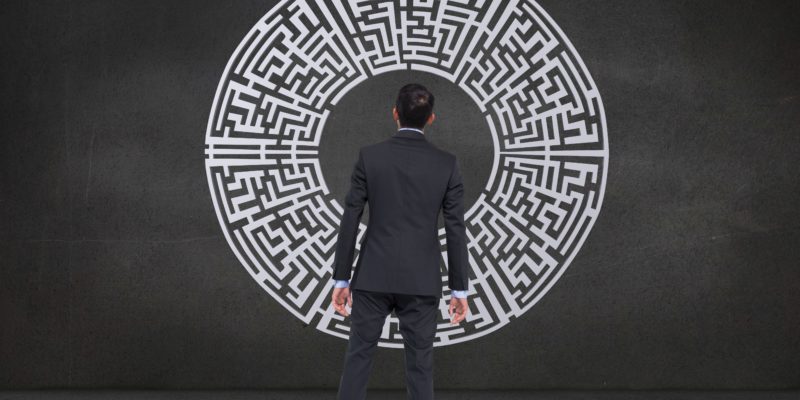The old guy smiled. His old Corsican eyes showed some understanding…: “How much do you have?”
-“I have a ten euro bill and we are leaving tomorrow…”
– “OK, boy, deal…but no receipt, right?”
Not understanding the shadow economy at the time, I accepted without knowing why is he not willing to give me a check. Anyway, I would not probably have cared even if I had understood.
Quote Worth Remembering
Recently, one of my trainees complained about the difficulty of mediation. According to him, it was multitasking, very stressing and complex activity. He was also afraid of his mindset once being in the real mediation for the first time.
“Well, the first time, I will be ill at ease…I cannot help myself…Mediation is that tough!”
“Everything is hard before it is easy” I answered borrowing one of the Goethe’s lines which has somehow comforted him. But I kept thinking of that line for it is not that simple as it sounds.
Well, first of all, it is hard to find out whether Johan Wolfgang Goethe actually said this. As much as this quote is associated with him, I have not succeeded in finding any trustworthy source confirming his authorship. In contrary, the same (or similar sentence) is also attributed to Thomas Fuller, an English churchman, and historian:
“All things are difficult before they are easy.”
To finish the confusion, Persian poet and literary Abū-Muhammad Muslih al-Dīn bin Abdallāh Shīrāzī also known simply as Saadi should have said:
“Have patience. All things are difficult before they become easy.”
Whoever was the author of this brilliant moral, it is definitely worth remembering: Not only for freshmen who are facing some task for the first time but also for teachers and educators who have some troubles to understand what their students and clerks are struggling with.
Conscious Negotiation
Within my introductory negotiation class at the Charles University, I ask the students to go to a retail shop and negotiate for a better price. Then, the next week, we hold a feedback session discussing the feelings they experienced prior to the negotiation.
Some of them are excited, more of them afraid or at least uncertain. There was even a couple of examples of frank confessions of failure to fulfil this task. Those rare students are usually paralysed by fear and not even able to enter the shop.

Notwithstanding the emotional responses, this is the first time they are conducting a conscious negotiation for the majority of them. What I call a conscious negotiation? A negotiation while being aware of the procedure one is involved in. Conscious negotiation is, contrary to its semi-automatic twin, accompanied by preparation, strategies generating and careful word selection.
Obviously, we have all negotiated before we experienced our first conscious negotiation because we bargained as children: “Mum, I will be a good boy tomorrow if you only let me watching TV longer…” This is probably one of the first trades we all concluded (although we asked for different concessions).
Consciousness, however, brings a different level of experience. As Max Velmans and Susan Schneider put it: “Anything that we are aware of at a given moment forms part of our consciousness, making conscious experience at once the most familiar and most mysterious aspect of our lives.”*
My First Time…

In order to become what someone will call a negotiation genius, one has to reach a stage of conscious negotiation. It brings you the main advantage of feed-back, learning, and awareness of your weaknesses and strong points. It is glamorous if you are gifted and negotiate somehow automatically. But should you prepare yourself and think carefully, your skills will reach a different level.
It is also usually your first conscious negotiation you will remember for the rest of your life. My first-time happened in 2002 in Corsica. We were traveling to this magical island for a high-school bike trip.
During one of our journeys, we reached a beautiful town of Bonifacio. As our stay was growing short I was desperately seeking a present to bring back home to my parents. I entered a pottery shop in the old harbour where I spotted a wonderful handmade ceramic bowl.
– “How much is it?” I asked the old shopkeeper.
– “This one? 15 Euro.” As I can see it today, my BATNA was of no good. I was terribly frightened and my language skills were very limited, yet I decided at that very moment to try my luck.
– “Ohhh…wonderful work! It was done by you?”
– “Yes, indeed…Thank you…” answered the flattered old man.
-“However, 15 EURO is too much for me…and here… You see? It has a scratch… Would you consider giving me a discount?”
The old guy smiled. His old Corsican eyes showed some understanding…: “How much do you have?”
-“I have a ten euro bill and we are leaving tomorrow…”
– “OK, boy, deal…but no receipt, right?”
Not understanding the shadow economy at the time, I accepted without knowing why is he not willing to give me a check. Anyway, I would not probably have cared even if I had understood.
Bowl as a Trophy

As fate would have it, seventeen years later, I still keep the bowl as a trophy (You can see it on the right picture). Indeed, I gave it to my parents who appreciated it, especially after I shared that story with them.
A couple of years later, when I was opening my Prague office, they arrived and gave it back to me as a surprise. “Keep this, it was the first thing you negotiated…” Every time I look at it it reminds me of the sunny morning in Bonifacio. I can still feel the excitement the negotiation then gave me. At the time, I did not now that I will be teaching negotiation one day but I recall having been really proud of my bargaining skills.
Frankly speaking, today, as I am writing this, I am not sure whether it was some natural negotiation power within me, or the old potter just felt sorry about the young fellow speaking some very poor French.
At that time, it was really difficult to manage myself to negotiate. And the same goes for my second, third time… Today, I do not consider negotiating hard. As Goethe put it: “Everything is hard before it is easy.”
And what was your first conscious negotiation?
*) Susan Schneider and Max Velmans (2008). “Introduction”. In Max Velmans, Susan Schneider. The Blackwell Companion to Consciousness. Wiley. ISBN 978-0470751459.
________________________
To make sure you do not miss out on regular updates from the Kluwer Mediation Blog, please subscribe here.



